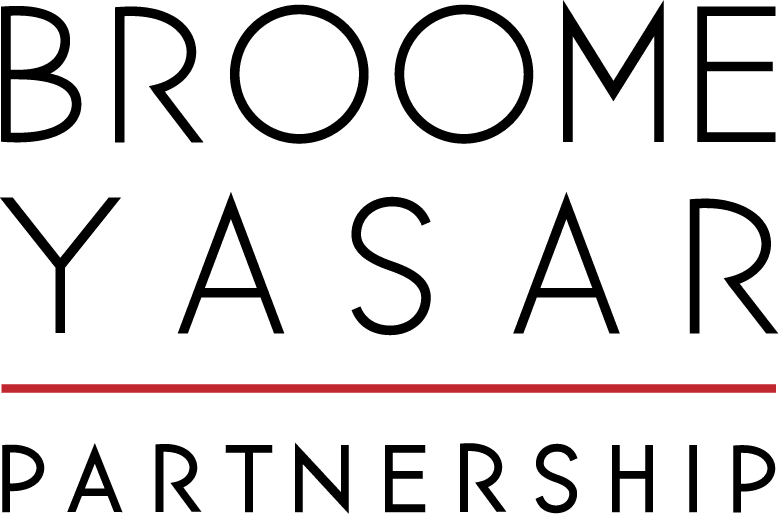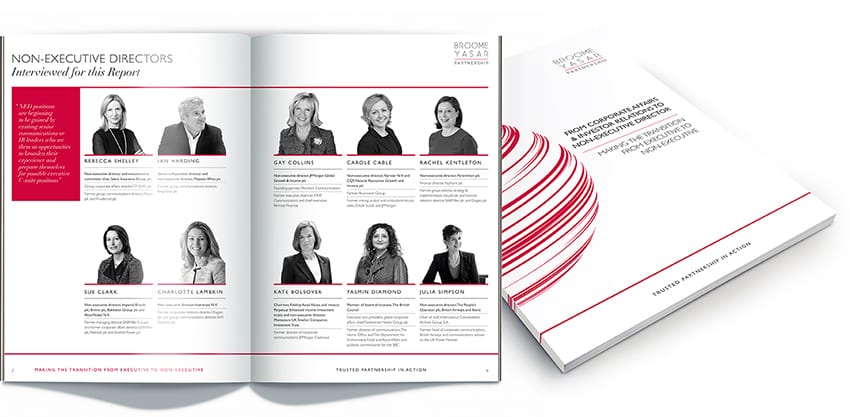NON-EXECUTIVE DIRECTOR: A CAREER ROUTE FOR CORPORATE AFFAIRS AND INVESTOR RELATIONS
A CAREER GATEWAY IS OPENING UP FOR COMMUNICATIONS AND INVESTOR RELATIONS PROFESSIONALS TO ENTER MAINSTREAM BUSINESS LEADERSHIP THROUGH NON-EXECUTIVE DIRECTORSHIPS. THAT WAS THE THEME AT OUR LATEST BREAKFAST SEMINAR, HELD TO LAUNCH THE THIRD OF OUR REPORTS ON HOW PRACTITIONERS ARE BREAKING THROUGH TO THE BOARDROOM.
Hosted by investment bank UBS, and in partnership with the FT Board Director Programme, the European Association of Communication Directors and the UK IR Society, the session featured insights and advice from four former communications and IR leaders who have taken non-executive roles. Our panellists stressed that such posts are in no way sinecures and are extremely demanding. For professionals wanting to demonstrate general management and business skills, however, this is a developing career route well worth the time, effort and preparation involved.
EVOLUTION IN THE BOARDROOM
Company boards have not traditionally spread their net for non-executive director recruitment widely across corporate affairs and investor relations.
Finance, accountancy and legal backgrounds have provided deeper pools of candidates who understand corporate life and are well-versed in its processes and websites. However, boards are under increasing pressure to demonstrate better stewardship and decision-making and foster diversity and inclusion. This has opened up a path for IR and communications professionals to contribute perspectives gained from their close links with investors, media and other stakeholders.
SUE CLARK
However, boards are under increasing pressure to demonstrate better stewardship and decision-making and foster diversity and inclusion. This has opened up a path for IR and communications professionals to contribute perspectives gained from their close links with investors, media and other stakeholders.
“IR and communications are increasingly becoming good platforms for a non-executive director’s career,” said Rachel Kentleton, finance director at payment services group PayPoint and a non-executive director at housebuilder Persimmon. “It’s about joining up external and internal stakeholders in a multi-faceted way from government through to shareholders. Having a perspective on that will be invaluable to any board because that’s probably a skill set that a lot of boards are deficient in; the joined-up stakeholder view.”
Sue Clark, a former managing director of SABMiller Europe and corporate affairs director of Railtrack and Scottish Power, who is a non-executive at Imperial Brands, Britvic, Bakkavor Group and AkzoNobel believes IR and communications executives can also provide muchneeded digital expertise in boardrooms. “That’s where I think corporate communicators and IR folks can really differentiate themselves,” she said.
RACHEL KENTLETON
SEIZING THE OPPORTUNITY
One of the most important mindsets, according to our panel, is to remember that your role on the board will not be advising on communications. You will be expected to contribute to the general running of the business.
“Make sure you have broadened your capabilities set beyond something that’s fairly narrow,” advised Rachel Kentleton, former strategy and implementation director at easyJet and investor relations director at SABMiller and Diageo. “The more you can demonstrate that you have actually been an operator in a business will add to your credibility with management teams around the board table. Financial literacy is absolutely important.” Sue Clark added: “ Remember there will be lots of other great candidates and they all can do the job. The board is looking for someone who can resonate around the table.
RECOGNISE AND BROADEN YOUR SKILLS SET
“Think about your CV,” recommended Amanda Mellor, group secretary at Standard Chartered and non-executive director at ventilation products company Volution Group.
“ Whether you are in IR or comms, you’ve got tons of experience. You’ve had access to the boardroom and operated across the business.”
She believes practitioners are “in pole position” to address corporate culture, purpose, reputation, sustainability and employee engagement, which are currently front of mind for boards.
Former JP Morgan corporate communications director Kate Bolsover added: “There are lots of skill sets that communication people have and I think perhaps the strongest of them in my experience is the ability to listen because you are on a board to listen and challenge effectively. If you don’t listen, you honestly can’t challenge.”
KATE BOLSOLVER
PICK A SECTOR YOU KNOW
“ Start somewhere where you have a skill set that you can bring to the table,” advised Kate Bolsover, who chairs Fidelity Asian Values and Invesco Perpetual Enhanced Income investment trusts and is a non-executive director at TR Property Investment Trust. Kate has been an investment trust non-executive since 2005 but already knew the sector well.
Rachel Kentleton, meanwhile, admitted to our audience that she has long had a penchant for viewing show homes! It makes the job more enjoyable because she is genuinely interested in the business, she said.
BE PREPARED TO TRY THE JOB FOR FREE
Kate Bolsover recommended Board Apprentice, a programme that lets aspiring non-executives attend board meetings and participate in conversations. “That can help tremendously with networks and job references,” she said. “I would also definitely go on the board of a not-for-profit organisation,” she added. “I know they eat you alive but it’s terribly important because you show you’re willing to learn and it teaches you the discipline of being on a board. You have to learn when to interfere, when to hold back and which battles to fight.”
Sue Clark agreed. “One of the things that really helped me was sitting on the boards of many of our company’s subsidiaries and joint venture partnerships,” she said. “That was very helpful because you could learn and see how other non-executives worked in quite a safe space.”
Amanda Mellor was adamant. “Go and speak to your company secretary,” she urged. “They will have lots of boards that they will be trying to find directors for. There are things that are close to home that will help you broaden out your CV. Remember that a board will be looking for the broadest breadth that they can get. Your CV has to tick as many boxes on their board matrix as possible.”
AMANDA MELLOR
START THE PREPARATIONS NOW
Making the move to a non-executive directorship involves planning and perseverance. “Be really patient but start now,” said Amanda Mellor.
“If you think it’s something you’ll do in five years time, you still need to start laying the foundations. It will take time and you might hear nothing for a year. You need to keep the oil on the wheels, keep going and start to build out the breadth of what you’re able to offer.”
We believe that companies are at the start of a trend that will see these types of transitions become more and more commonplace. This has to be the start of a sustained campaign to raise the profile of corporate affairs and investor relations as a potential source for the next business leaders and non-executive directors. It used to be an ambition but now it is a reality as our panellists prove.



